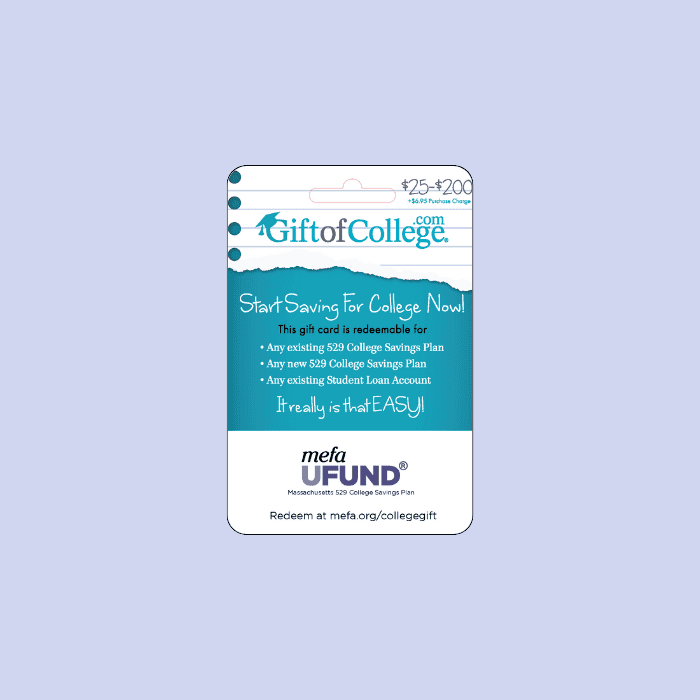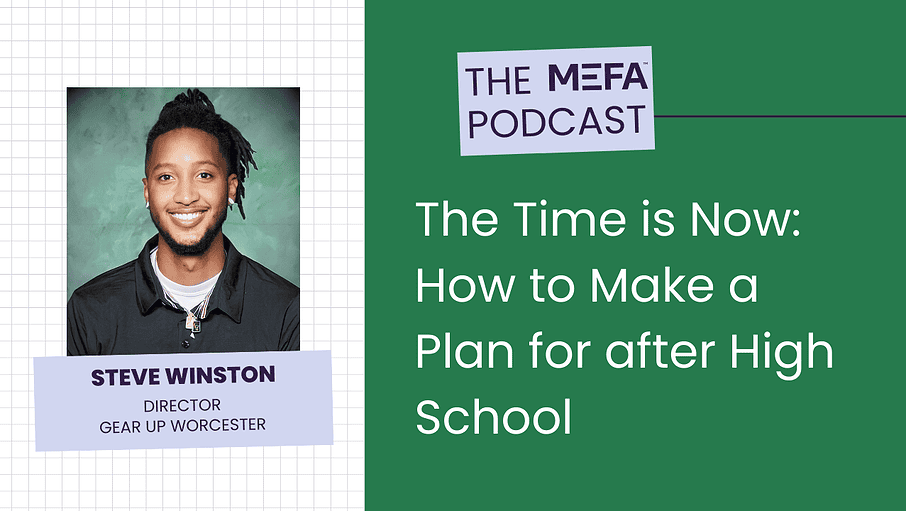

Resources Mentioned in this Episode
Jonathan Hughes: [00:00:00] Hello everyone and welcome to The MEFA Podcast. My name is Jonathan Hughes.
Julie Shields-Rutyna: And I’m Julie Shields-Rutyna.
Jonathan Hughes: Hello, Julie, how are you?
Julie Shields-Rutyna: Oh, I’m fine. How are you Jonathan?
Jonathan Hughes: Doing okay. Doing okay. We have got a great show for you today. We’ve talked in the past about MassEdCO and they’re partners of ours and they’re doing great work offering free assistance and college and career access for underserved and first generation students in Massachusetts, among others. Well, we have their new director of GEAR UP programs on to talk about the various pathways to college and career that they can offer, as well as sharing some of his own story and his own thoughts.
And it was great to meet him and I loved the perspective that he brought. So stick around for that. [00:01:00] You’re going to want to hear that. But what do we have first, Julie?
Julie Shields-Rutyna: Yes. Well, we have more college and career pathway talk. A while ago you spoke with Jennifer Bento-Pinyoun, who is our director of MEFA Pathway, about some new developments on that ever expanding resource. So let’s go to that.
Jonathan Hughes: Periodically, we’d like to check in with MEFA Pathway, our college and career portal. And so we’re joined today once again by the director of MEFA Pathway, and she’s going to tell us all about that. It is my pleasure to welcome back to the show, Jen Bento-Pinyoun. How are you, Jen?
Jennifer Bento-Pinyoun: Hi, I’m great. Thanks, Jonathan. Always an honor and a pleasure to be a guest on your show, so thank you.
Jonathan Hughes: Oh, my pleasure. My pleasure. And it’s okay. I called you Jen. I didn’t say Jennifer. We we know one another. Yeah, yeah. Okay. Now, before I get into the enhancements and all this stuff, can you remind everyone at a really high level what MEFA Pathway is? Who is it for and what can, what can it do? Sure [00:02:00] thing.
Jennifer Bento-Pinyoun: So MEFA Pathway is a cost-free online college and career planning platform. It’s available for any and all students in Massachusetts in grades 6 through 12. MEFA Pathway supports all types of career paths or directions students may choose to go in.
So whether that’s a two or four year college earning a certification in a specified area going into the military, taking a gap year. Going directly into the workforce MEFA pathway helps students identify areas of interest, talents, skills that are transferable to post-secondary planning.
Jonathan Hughes: Yes. And I know sort of enumerating everything that it does is really hard to do and it gets harder all the time because the list of what MEFA Pathway has to offer gets longer every time I ask you. So tell me, in the, in that same spirit of making things more difficult to summarize, what is new on MEFA pathway for students?
Jennifer Bento-Pinyoun: Okay, so we do have a couple of items. We are constantly updating the [00:03:00] platform, adding new features, and most of our recent updates one of our most recent updates is the connection between a specific program of study. And colleges that offer that selected program. So, to explain how it works in the exploratory phase students start by applying their top interests, their values, and their skills from their assessment results to the career search.
So through this, possibly honing in on a particular career category they’d like to pursue. So from here, the students start to explore careers and looking at specifics to get into a particular career. Maybe things such as required education level, projected growth of a career wages earned. Daily tasks, work activities.
Also included on this details page in the career search is a program of study where the student can look at those programs study that are related to the selected career. So for example [00:04:00] if we have nurse practitioner. As an example, is being explored programs of study would include maybe a pediatric nurse surgical nurse women’s health nurse.
So now with this enhancement, students can click on a. Program of study, and it will bring them directly to the college search page. So this automatically filters a list of colleges that offer, that selected program of study. So from here, the students now on the college search page, they can apply additional filters.
So maybe that’s a location. Size of the college, and then they can start to explore college options.
Jonathan Hughes: I’m curious, how did these enhancements happen? Do the ideas for these things, did they come from students? Did they come from counselors? Did they come from you know your team?
Jennifer Bento-Pinyoun: Yeah, great question. We are constantly requesting feedback from our MEFA Pathway users. So mostly comes from educators. But we have also received by way of the educator feedback from students. We’ve also worked with [00:05:00] the Executive Office of Education in the development of our features that are related to the labor market.
Information so we have a number of different, you know, different ways We collect that feedback and as the, as we collect the feedback, it’s tracked, it’s reviewed, and it helps us to determine new features and enhancements to both the student and the counselor platforms.
Jonathan Hughes: There’s also. A piece for counselors, high school counselors, right?
Jennifer Bento-Pinyoun: Yes. So we had a couple geared towards the counselor portal. So we had an existing one of which being we had an existing course planner tool that we made significant changes to based upon that user feedback. It’s the same idea, but now the tool is much more intuitive, intuitive and flexible.
So schools have the option to build a course catalog in the counselor portal based on their school’s program of study. They add all the subjects offered at the school, the credits required for graduation, and then all of the courses available within each subject. They can also identify if a course counts towards Mass. core [00:06:00] requirements, which is the state recommended program of study that aligns with the high school courses and post-secondary planning.
So additionally, within this tool, the schools can add their standard graduation path along with any specialized programs the school offers. So once the course catalog is complete and published, the students can then manage their coursework to. In the student portal by adding courses that they’re taking planning to take, and then once they’ve completed the course, they can update the credits and the grades earned.
So it’s a great way for students to make sure they’re staying on track to meet graduation requirements and develop a trajectory over the course of the four years of high school. Another thing that we worked on extensively this year in relation to the, to the counselor portal was building out our curriculum resources, which are specifically designed to support our educators as they implement MEFA Pathway at the schools.
So the curriculum includes 8 to 12 lessons per grade level that align with the activities within MEFA Pathway. So [00:07:00] this these resource resources are located post login through our counselor portal. Which our participating schools have access to, and we’ll continue to expand on this throughout the upcoming school year and beyond as well.
Jonathan Hughes: I understand that there are more developments, not necessarily, or is it for counselors or is it for students, but there are more developments on tap as well, right?
Jennifer Bento-Pinyoun: Yes. Plenty of great. Items on tap. So one we’re especially excited about is a brand new feature around work-based learning. So this is where schools will be able to develop a library of local opportunities available and the students will be able to view within their account.
Jonathan Hughes: And then, can I stop you? Can I stop you quick and ask about what exactly that means? Work-based learning and what might some of those opportunities, resources be?
Jennifer Bento-Pinyoun: Yeah, that’s a great question. Yep. Those opportunities may include internships, externships, co-op, job shadowing. So the school has- the tool will allow the educator to develop [00:08:00] what. Whatever offerings they have at their school and manage those if they’re active or not active, year to year. And then again, the student would be able to view those and explore those further on the student side.
Jonathan Hughes: And this is, I mean, is this something that is becoming more popular, you think?
Jennifer Bento-Pinyoun: Absolutely. More and more schools are developing work-based learning programs for sure. So this would be a, a quite a benefit for our schools.
Jonathan Hughes: Yeah, it’s interesting to see that for sure.
Jennifer Bento-Pinyoun: Yeah and then also we’ll be making some updates to our resume builder, which is one of our most highly utilized features in the student platform, so that’s exciting as well.
Jonathan Hughes: You know, we talked about counselors. Being able to utilize this within their schools. But it’s not just schools or school systems that that can use MEFA Pathway. Right. It it’s open to families and students and CBOs, community-based organizations. So if anybody is interested, they hear this and they wanna sort of check out MEFA Pathway, what do they need to do?
Jennifer Bento-Pinyoun: Yes. So as you said, any student can create an account. To [00:09:00] access all the great activities in MEFA Pathway as a student, go to mefapathway.org and click I’m a student. And then as a first-time user, you just select that option and you would go through the registration process. It’s very easy as an educator, if there’s interest in learning more about MEFA Pathway where our team is always available, just send an email to [email protected] and we can chat further and I’ll just add that to remember that MEFA Pathway is a no-cost resource that MEFA provides as an extension of all the great other resources that MEFA offers. So we certainly encourage you to take advantage.
Jonathan Hughes: Thanks, Jen.
Jennifer Bento-Pinyoun: Anytime. Thanks for having me.
Jonathan Hughes: Now it is time for the MEFA Mailbag. These are questions that have come into us over the past few weeks and been answered by our college planning team. So remember, if you have any questions, you can email us at [email protected] or you can call us at [00:10:00] 1-800-449-MEFA, or you can also reach us over social media. That’s on Facebook @MEFAMA, on Twitter, or do I say X? Now I’m going to say Twitter at @MEFATweets and Instagram @MEFA_MA. So I said all of that just now. I’m going to come clean. I’ve lied to you. We are not going to take a question that has come into us through the email or from a customer. I said all that because I wanted you to have that info if you have any questions.
But in fact, what we’re going to talk about, I’m going to ask Julia a question about this campaign that we have going on in the month of August. It’s called, The Time is Now. So Julie, what is The Time is Now all about?
Julie Shields-Rutyna: Yes, so that is all of our great information that we have going out, that’s going on right now in August. And you can [00:11:00] find out about all of that at mefa.org/yourfuture. So everything that we’re doing in August is right there. And this is really targeted for students recently graduated students or just others who don’t really have a solid plan for the Fall. So, you know, maybe they weren’t sure if they wanted to attend college or not.
Or someone wants a change. They’re not sure exactly, but they’re kind of thinking they would like to be doing something in the Fall. So we are going to showcase all of the options and opportunities that are available to people and that are where they’re not too late. They can, even if they just get on it and get busy right now, they can take advantage and start something in the Fall.
So we’re going to have some webinars talking about all those different options. So I’ll give an example. Last week [00:12:00] we had a webinar that was presented by the Massachusetts Association of Community Colleges, where they talked about the wide array of programs at those community, at all Massachusetts community colleges that are, that will lead to you know, growth in careers but are not degree programs as, as someone starts them. But these were a lot of programs that actually have funding attached. So a student could get paid to go to school and then move into a work environment. So sort of stepping stones and, and blocks to move forward in a career that really takes advantage of your interests and skills. So when you go to that website, you can still see that was recorded. You can still see that webinar. That was terrific. And then there are other webinars coming up. The one this week will about be about [00:13:00] college programs that it actually isn’t too late. Some colleges are still accepting students right now, and especially our community colleges.
And so this group of experts will tell you. What steps you can take right now to still, you know, enroll in college in the Fall? Another piece of it is we’re going to have what we’re calling a FAFSA Festival. If you want to enroll, but you haven’t done your financial aid forms yet for this, you know, to enroll in September.
This FAFSA Festival will be a place that people can join. A meeting and we can pair you up with an expert and get that form done right, right. Online, quickly. So there, the point of of this is that there are lots of resources available to you, available to students, available to everyone.
Also on that, webpage, mefa.org/yourfuture. We share other podcasts that we’ve done on, on these type of topics. We share some blog posts that have [00:14:00] been written and we talk a lot about how you can get in-person. Or one, one-on-one help as well. So people can always come to MEFA. The other great organization that you mentioned, MassEdCO has availability for one-on-one in-person appointments and online appointments too.
So the campaign is really to reach people to say, There’s a lot that’s available to you. Take advantage of learning all of the options and see where you want to go from there. And there are a lot of people to help you with your decisions about the future. Last but not least what plays prominently is our own tool, MEFA Pathway and how that is such a great tool for allowing people to go in, learn about themselves, learn, think about their interests, their skills, and how they could apply those to a post-secondary, you know, plan.
So and some of the webinars that we have are [00:15:00] available to allow students to go in and set up an account, start using the tool and see all the great features. So yeah.
Jonathan Hughes: That’s great. And I think it’s, always good for us and good for people to know that this is just not, not just a MEFA thing. This is a whole sort of umbrella of organizations that are in this effort with us.
One of them, as you said, MassEdCO, we’re going to hear in just a minute from the new Director of GEAR UP programs there. So let’s go to my conversation with the Director of GEAR UP programs for MassEdCO, Steve Winston. MassEdCO is the Commonwealth’s largest provider of community-based education and career readiness services for low income, first generation, underrepresented in marginalized youth and adults in Massachusetts.
That’s a lot to say. They are an amazing organization. They’re a valued partner of MEFA. They’re headquartered in Worcester, but have offices [00:16:00] throughout the state. And our guest on the show today is the new director of GEAR UP programs for MassEdCO. His name is Steve Winston. Welcome to the show, Steve.
Steve Winston: Thanks for having me.
Jonathan Hughes: Absolutely. So I gave a little bit of background there about MassEdCO, but can you tell me about your background. What’s your journey been to becoming the Director of MassEdCO GEAR UP program?
Steve Winston: I’d love to. So I am originally from Springfield, Mass. I went to school at Westfield State University where I was navigating through the whole college process on my own.
I was winging it every day from picking majors, from picking the colleges, from figuring out what I wanted to do. And throughout the college career and changing majors, maybe about five times, I settled on a program that was at the Urban Studies Program, which offered ethnic and gender studies, which ultimately, means social justice.
And I fell in love with that because it had bits and pieces of all the majors I switched from, from criminal justice system to the [00:17:00] school system to psychology, to social work. So I was like, this makes sense. Let me get this social justice degree. But at the time, this was back in 2014 where social justice wasn’t predominantly at the forefront of things.
People just went with how life went. So, whenever, I applied for a job, I had to explain my degree. And I had to explain what it meant, what I can do, and that kind of thing where diversity, equity all that intertwines, but at the time, businesses weren’t looking for that, so it was very hard to navigate.
But what I did know is I always wanted to be that kid that well, that adult that I needed when I was younger. So I was like, let me go back to the youth. And I worked at afterschool programs. I worked at nonprofit organizations. I was a caseworker. I was a Program Director at the Boys and Girls Club in Springfield.
And I was just doing things like that. I. But at that time I felt like I was not getting too far in my career because I still didn’t know what I wanted to do. I was still winging it. I winged it from college, still winging it in the adult world. So I [00:18:00] cast my net even farther and I said, let me try Central Mass.
So I was applying for jobs in Central Mass. But I knew what I wanted was a better schedule. I wanted like that Monday through Friday kind of school schedule, but I didn’t have the credentials to be a teacher or anything because I had a social justice degree. But what was cool about this job that I started four years ago, which was at MassEdCO as an education advisor, it was like a bittersweet job.
When they explained it to me, it was explained to me that I would be helping people in the inner city, which I’m from the inner city of Springfield, navigate through their whole college and career pathway. And when we talked during the interview, I was like, I wish I had this in my school because I probably would be farther than I am now.
So that’s how I landed in MassEdCO and I noticed that they had so many awesome programs from youth all the way to adults. Especially what they focused on. It wasn’t focusing on just anyone. They had the marginalized community that they knew needed this because I was that community that needed it.
And that’s why I was all on board becoming that [00:19:00] education advisor in the beginning of my career.
Jonathan Hughes: And, and have you found that you’ve been able to be that person that you wished that you had when you were going through the process for other people?
Steve Winston: Definitely. So when I first started two years ago, I was an education advisor at North High School and my supervisor was Taryn Tompkins. And I always, every time I helped a kid, I would turn around and say, this is bittersweet, because if I knew what I just told that kid I would be light years ahead because I wouldn’t be in like financial debt. I would’ve knew how to go through that financial aid process. My parents would’ve known. Like I said, we were winging it, we were signing papers.
We filled out the FAFSA, we were taking out loans. But just getting the knowledge as I was learning the job I. It was an eye-opener because I’m like, there’s ways around this. There’s ways to not be in debt. There’s ways to look for careers before you graduate and I didn’t know that,
so, so
Jonathan Hughes: let’s get to some of the ways that, that, you know, we can get that word out. Tell me more about MassEdCO’s statewide focus, and we’re going to talk about Worcester in a little while, but the statewide focus [00:20:00] on college and career readiness.
Steve Winston: So the big thing about MassEdCO is we’re umbrella, so we’re overlooking all different types of programs. We have programs in different schools, programs in different cities, as you started off saying, but predominantly what we try to do, Is expose everyone in these programs to things that they wouldn’t see, especially in the inner cities.
I always think of the word, they’re in the city. A lot of the people we work with don’t get out of the city, and a lot of the people that we work with don’t know what’s out of the city. They don’t even know what’s in the city. So what we do at MassEdCO is showcase what kind of opportunities there are, what kind of resources there are. And what I love about it is we collaborate all through Massachusetts. So we collaborate with programs, we collaborate with colleges, we collaborate with MEFA because it makes partnerships way easier when you have a relationship with these kind of programs that to then when a client reaches out to you, you know who exactly to contact, you could say, got the perfect thing for you right here.
Talk to this person. We can get you through this way, or we can get you through that [00:21:00] way. If this is not the time for you, let us know. We might have more options later down the road. So I feel like MassEdCO as a whole. It’s just a great umbrella that just has a lot of resources under it.
Jonathan Hughes: And so the GEAR UP Program specifically, can you tell me what, what would fall under that?
Steve Winston: Yep. So with GEAR UP, we focus on that high school level. So our clients are high school and we focus on middle school as well. And GEAR UP is a acronym. It stands for gaining early Awareness and Readiness for undergraduate programs. A lot of people don’t know that. But that’s literally what we do. We bring early awareness. So that’s why I was saying when I was working, I’m like, I wish I knew this before. So that’s what we do for the kids. We start around seventh grade all the way through 12th grade, and we even have a 13th year. So we even follow them outside of high school to make sure that as we take off those training wheels, they’re still able to ride that bike.
So a big thing that we do is expose them to things and we don’t expose them to say, like college is for, not for everyone. We expose them to here’s all the [00:22:00] options that you have, you ultimately decide. And especially with my advisors that I have under me now I always talk about we’re given that advice.
We’re giving them options. We’re not saying, this is your future, this is what you should do, this is what you shouldn’t do. Just putting it all out there. And a great thing that I think we do, especially for GEAR UP which I love about GEAR UP, is we think outside the box. So if we have athletes that want to play at a D-1 school and they don’t have a career in, or a major or anything like that in their mind, or if we know making it to the Major leagues doesn’t always work out, we make sure they have a plan B, C, or D.
And we will go to, like two weeks ago, we went to the WooSox stadium, and we didn’t go to see a game. We went to talk to the people that make the WooSox. We talked to athletic trainers and marketing teams and how that is promoted and marketed. We even had weatherman come to talk about just how they have to contact meteorologists to make sure the [00:23:00] game can go on.
So that’s just giving those kids that early awareness to things that are there. If they want to be around that sport, say they didn’t make it to the major leagues, they could still be around the sport.
Jonathan Hughes: Well, you mentioned the WooSox, and that kind of leads into my question about Worcester specifically. What’s special about Worcester and the people and maybe the resources that are there and the challenges that exist there?
Steve Winston: Good question. So the biggest challenge I see because I’m on the outside looking in, so coming from my city, I had to learn everything out here. I had to see what options, or my job is to find the resources.
And then when I find the resources and realize they’re in our backyard right in front of us, sometimes I’m talking to the kids like, you didn’t know this. You didn’t know that? And they’re like, no, I didn’t know. How would I know? So that’s why my job and the job of GEAR UP and MassEdCO is to showcase what those things are.
Our clients aren’t going on Google and Googling different resources for this and that. Sometimes they need just to hear somebody that they know, [00:24:00] direct them into the direction that they’re trying to go to or navigate through that.
Jonathan Hughes: What kind of things do you hear about college costs from the students or is that on their mind? Are they thinking about that? And then what resources. Can they utilize as they do go through that journey?
Steve Winston: So, as we know, technology’s booming, TikTok is booming, influencers are booming, podcasts are booming. So it’s not like when I was in school and they can say, if you go to college, you’re going to make good money.
There’s no doubt about it. They seen it. I’m a millennial, so we were the ones screaming at the hilltop, like, get us out of debt, help us. So it’s hard when it comes to even them wanting to apply to college because they’ve seen the millennials go through and they’re saying, that doesn’t seem fun. That doesn’t seem feasible. There’s influencers that don’t have a degree and are making twice as much as you’re making with your degree. So how can you showcase that? And a little bit about my background that I didn’t mention is I was a interim [00:25:00] guidance counselor at North High School the year before last. So I got to see that aspect, which was awesome.
And then after that, I became the college and career teacher there, classroom. So I seen the kids from guidance, which the academic aspect of it. Then I went into the classroom for a full year and taught the kids college and career readiness. I started out as an advisor at North and now I’m the director, so it came full circle.
So I seen the kids in different aspects and it was very hard to. Tell them about college sometimes is the answer. Sometimes it’s not the answer. But the good thing about it, especially in Worcester, especially like at QCC is there’s other programs kids think college means degrees. Colleges mean certificates. Colleges means trainings. They have EMT at QCC. Now I believe they have the police academy. I think they just got mechanics there. So going to college doesn’t necessarily mean you need a bachelor’s degree. Going to college just means you’re trying to get a little foot ahead of someone else so that you can be [00:26:00] able to showcase yourself.
Everybody’s going to graduate with a high school diploma, and that’s your competition. So what’s going to set you apart? So that’s how I showcase that financial part, especially in the inner city. There’s ways around it. That’s why I said it’s bittersweet for me when I find out colleges have free tuition if you live in this area or this zip code. I didn’t know that. I didn’t know where to look either. So me looking for them makes it a lot easier.
Jonathan Hughes: How is MassEdCO then advising students who recently graduated from high school and maybe they haven’t yet made a plan for the Fall? You see somebody come in or contact you, where would you start with that person?
Steve Winston: So what I do is I try to, especially coming from a college and career teacher a lot of the kids didn’t necessarily create goals. So they weren’t able to have a goal to say, this is where I see myself in 10 years. They were just trying to get through high school, which we all are. We’re just like, we just want to be done, we want to graduate, start our life.
But we know how adulting gets. So a lot of times I’ll bring it back all the way to [00:27:00] beginning of that, like, let’s sit down. And it’s hard to make a goal when you don’t know what your options are. So what I usually tell them is, what are some hobbies? And what I like to say, especially the kids that I work with is I like to turn hobbies into hustles.
So it’s like, all right, let’s find your hobby, what you like, what you don’t like, what kind of schedule you like, and then we’ll, pick and choose, like, all right, this is what this person does, this is this career, this is this salary. And a great thing that we do too is a career assessment with our students.
So we can even pull back to that. We even had, when I was a teacher, I had them take a lifestyle survey. So you got to choose what kind of lifestyle you want to live, and it would tell you what salary you needed to live that lifestyle. So if you want all the fine things you need to make this much salary, so then say your goal was to being a social worker.
When we look at the salary after you take that, that lifestyle, does that match? Are you happy with that? If you are, great now that’s just a footstep further going down that path. If you’re like, nah, I want to make a little more money than that, then [00:28:00] let’s, let’s go in a different direction. So if they’re out there, I would bring them back to that level rather than saying, let’s just fix your resume, let’s get you out there.
Let’s navigate together, and that’s what MassEdCO does. We are advisors, like I said in the beginning, we’re just giving advice and options. We’re not trying to put you on a path, we’re trying to make you notice that there are multiple paths that you can walk down and we’ll walk down them with you.
Jonathan Hughes: Do you find ever that you, there are students who, you know, they may know, may not know what they want to do, but perhaps somewhere along the lines they got the message that. Let’s say college specifically was for somebody else, and not for them, but they really, you know, just because they, they maybe listen to some of these influencers or, or some of the messages that, that you get maybe secondhand or maybe inadvertently. Do you ever run with students who just think that that’s not for them? And it might actually be for them, it might be an [00:29:00] option for them.
Steve Winston: Yep. All the time, and it’s only because once I get to know, my big thing is relationship building. So when I build those relationships with the student, I get them a little more so, and they get me a little more so they know I’m not just talking just to talk.
I’m not saying college is for everyone. I’m really, ultimately, genuinely caring. Let’s see what options you have. You might not want to go to college now, and a lot of kids don’t understand how college works. So sometimes it’s like I just did 12 years, if not more. I’m waking up at seven o’clock, I’m getting out at two, I’m going class to class.
And then sometimes, and I did a disservice too at my, when I was teaching, ’cause it was my first year, the kids asked me, what is college like? Like the lifestyle like, and I’m like, oh, I just thought y’all knew that off the bat. I’m teaching you about majors and back degrees and stuff. And they’re like, no, tell us how a day-to-day as a college student is.
So then we get college students to come in and say, I only have one class a day and they’re like one class. Like I could do that. And I’m like, yeah. And that’s what they don’t realize sometimes [00:30:00] is college sounds so intense, but they can do it at their own pace. They’re trying to follow some kind of cookie cutter way, and it’s not like that.
If college is not for you, take a class and see if it’s for you. Maybe you’re like, oh, this is a breeze. I can take two classes. Now they have it made because you can even do it virtually now, so you don’t even gotta leave your bed and you’re taking classes. So I would just say if we sat down and found their career path and it needed some kind of college, we would start off there.
Let’s go part-time. Let’s do one, one or two classes. We’ll go down to QCC together if we need to and just see how it is. And I think that’s where they miss it is because. They didn’t get exposed to it. They don’t know the options. They don’t know the resources. They don’t know that a lot of these places are partnering with MassEDCO.
They can go to these colleges and ma they know MassEDCO, they know GEAR UP. So it’s not like you’re out there by yourself trying to figure it out. We’re going to be there.
Jonathan Hughes: I know that a lot of students are to, I mean, it’s human nature, not just students parents as well. I mean, people are [00:31:00] shy to reach out to a resource and say, can you help? What. Can organizations do to build trust?
Steve Winston: So that’s a good question and I think I do have that answer. MassEdCO, you could say, is a brand. Or trying to create itself as a brand so that when you see it, you see us. So, you know, it’s not like you’re calling someone you don’t know who’s on the other line.
We go to career fairs, we go to college fairs. We’re in the school system. We’re at these schools. Like we have some advisors that go directly to these colleges and sit and wait for students that maybe went through us and say, this is us when you’re out there in the field, because that’s where our clients are.
They’re out there. We can’t sit in an office space and hope that one day they give us a ring. We have to be out there. And I think a lot of organizations think, which is why a lot of these resources are unused, is because they’re waiting for them to come to them. We need to, they don’t know we’re out here.
I didn’t know MassEdCO existed until I [00:32:00] came out to Worcester, and I didn’t know that until I went on to Indeed. And then I didn’t know all the things that they did until I got into the program. And there’s no way that I would’ve just came across that just from. It’s scrolling somewhere.
Jonathan Hughes: If anyone’s hearing this now and they want more information about MassEdCO, where do they find you?
Steve Winston: So you can go to massedco.org. Simple as that. All our resources are there. GEAR UP. I wouldn’t say unfortunately because we can still help you because we still have advisors that help people that don’t go to North. But GEAR UP is predominantly at Worcester East Middle School and North High School.
So that’s the schools that I work with, but our EOC program. Which works with anyone that gives us a call. And like I said, we’re advisors, so you don’t have to call with an idea. You can just call and say, I’m thinking about something. And we will walk you through that. What are you thinking about? Are you thinking about a career? Are you thinking about returning back to school? If you do return to school, what are you going to school for? Are you just going because you felt like you should? Or is this a great time? Do you know what degree you want to get? Do you even need [00:33:00] a degree? A lot of times I’ll give you this short story when there’s a lot of people that go to college because they want to run a business.
But sometimes they don’t know the what kind of business they want to run or they do know what kind of business they want to run. And if they do know early on, there’s other ways around it that you might not have to get a certain degree, but you’re going for that business degree. So say for example, you want to own a nail salon or a barbershop. Meeting us before you get to that point, we would walk you through that because you can get a business degree to learn the business management part.
But sometimes if you want to practice barbering or you want to practice hairdressing, you would have to go to trade school. Which would be cosmetology school, barbershop school. And you would have to get a license. So what we don’t want you to do is do this blindly and wing it, because we can skip steps.
We’ve been through it, I’ve been through it. I “wung” it, that’s the word. And sometimes I realized there was a quicker way to do this. It was a cheaper way to do this. And that’s what we’re here for. We have multiple advisors that went through multiple pathways, so you have [00:34:00] options and if we don’t know the answer, we’re going to find it for you.
We have those resources to do that. We have those people to talk to. We all come from different backgrounds, different educations, different degrees, different trades, and different lifestyles and cultures. So we get it. And that’s why you should contact us to see where you might see yourself, because then we can help you get to that point.
Jonathan Hughes: And I want to hammer this home. This is free. All of your resources are free.
Steve Winston: Yes. A hundred percent free. And then we’ll direct you two more free resources if we have them. The best thing that I love about MassEdCO is we want you to not go into debt. We’re not trying to sign you up for things or get you into programs that you’re not familiar with, and then take our hands off and say, good luck.
We’re there for the long run. We’re going to walk you through it. We’re going to advise you. This is the better option. We’re going to give you options. You might want to look at this if you want to come in. We have virtual, we have remote, we have in person. There’s options. So it’s not like we’re leaving you hanging, you’re not on an [00:35:00] island. We will send the boat if you are. And we’ll come help.
Jonathan Hughes: Well, it was great to meet you. Congratulations on the new position. And I think after speaking with you, that’s they’re lucky to have you in that, in that spot.
Steve Winston: Alright. Appreciate it too. It was a great time. I. Alright folks, well that about wraps it up for us.
I
Jonathan Hughes: want to thank Steve Winston for sharing his time and his story with us. And if you liked what you heard in the show today and you want to know more about planning, saving, and paying for college and career readiness, well then you can follow us on Apple Podcasts or really wherever you get your podcasts.
And please remember to review us because it helps us to keep doing what we’re doing here and giving the show out to folks like you. Julie, thank you once again.
Julie Shields-Rutyna: So happy Jonathan, always.
Jonathan Hughes: And I want to thank Shaun Connolly, our producer and AJ Yee and Lauren Danz for their assistance in posting the show.
Once again, my name is Jonathan Hughes and this has been The MEFA Podcast. Thanks. [00:36:00]













